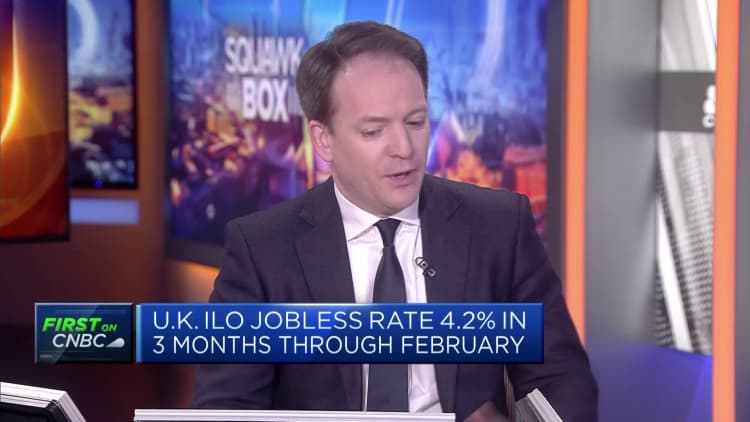
Inflation in the U.K. eased to 3.2% in March, the Office for National Statistics said on Wednesday.
That was slightly higher than the forecast from economists polled by Reuters of 3.1%, but was down from 3.4% in February.
Food prices provided the biggest downward drag on the headline rate, the ONS said, while motor fuels pushed it higher.
The core figure, excluding energy, food, alcohol and tobacco, came in at 4.2%, compared with a projection of 4.1%. Services inflation, a key watcher for U.K. monetary policymakers, declined from 6.1% to 6%.
This week, investors have been monitoring signs of a cooling U.K. labor market, with unemployment unexpectedly rising to 4.2% in the period between December and February. Wage growth excluding bonuses meanwhile dipped from 6.1% in January to 6% in February.
Bank of England Governor Andrew Bailey on Tuesday said he saw “strong evidence” that higher interest rates were working to tame the rate of price rises, which has cooled from a peak of 11.1% in October 2022. The central bank’s own forecast is for inflation to “briefly drop” to its 2% target in the spring before increasing slightly.
But a higher-than-expected March core print firmly above 4% is likely to increase speculation that inflation is proving stickier than recent forecasts have suggested, and the timing of the first interest rate cuts may be moving further down the line.
Market pricing currently suggests the BOE will implement two interest rate cuts in 2024 from its current rate of 5.25%, starting in August or September. Uncertainty over this timeline has now increased, given signs of continued inflationary pressures in the U.S.
Camille de Courcel, head of European rates strategy at BNP Paribas, on Wednesday told CNBC’s “Squawk Box Europe” that the latest data showed that the U.K. was “going in the U.S. direction” and provided a risk to her call for a June rate cut from the BOE.
While labor data surprised to the downside, the ONS has cautioned its month-on-month figures may be skewed by methodological issues. That means the BOE’s Monetary Policy Committee will be far more focused on upside surprises on wage growth and services, de Courcel said.
The British pound moved higher against both the U.S. dollar and euro following the announcement, trading up 0.1% against the greenback at $1.243 and 0.15% stronger against the euro at 1.1718.
U.K. Finance Minister Jeremy Hunt, who is gearing up for a national election this year, said on social media platform X that the inflation data was “welcome news.”

